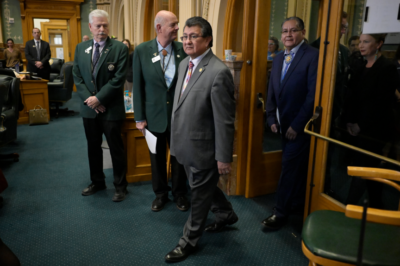Having been left out of the conversation for nearly 150 years, the leadership of two Colorado-based tribal nations addressed the Colorado General Assembly for the first time in history this week, providing a long-silenced voice for the historic peoples of the state.
Former State Senator Kerry Donovan carried the bill in the 2022 session that set the stage for the tribes’ annual address to the General Assembly. Donovan was at the Colorado State Capitol on Wednesday to hear the address.

Featured image courtesy of the Denver Post: Chairman Manuel Heart from the Ute Mountain Ute Tribe, center, and chairman Melvin J. Baker from the Southern Ute Indian Tribe Tribal Council are welcomed in the House Chamber of the Colorado Capitol in Denver on Wednesday, Jan. 11, 2023. (Hyoung Chang, The Denver Post)
The leaders of the Ute Mountain Ute Tribe and the Southern Ute Indian Tribe Tribal Council spoke movingly of what it has meant as a people to be stripped of their hunting lands on the Western Slope … to have had to fight decades for the return of their ancestor’s remains from the shelves of history museums across the West.
The two tribes are sovereign nations, and both shared the tribal pain of generations of children sent away to Indian boarding schools where abuse, neglect, and the “shaming away” of their tribal identities was rampant.
Bringing the loss forward to today, they reminded Colorado’s elected officials that Native American history is not taught in the state’s schools.
“We cannot change history, but we can work together, for all of our children,” said Heart.
They raised the critical issue of water rights, and of being excluded from the negotiations regarding Colorado water rights as not just a slight to the dignity of the tribes but an economic survival issue. Heart called the tribes’ fight for water rights which are owed to the tribe, but not quantified “paper water.”
Tribal leaders also brought up the fact that they were left out of the discussions surrounding where sports betting is allowed and questioned the impacts that sports betting may have on their communities over time. They weren’t consulted when online betting was legalized in 2019, and they say the exclusion is cutting into their revenue from on-site sports betting, which is impacting their social services program budgets. Online betting is primarily the domain of big companies at this point, and tribal leaders say they need to be allowed to conduct online betting too.
They received some assurances from Colorado State Senator Julie Gonzales (Democrat — Denver). “Now that it has been raised, we must address it,” said Gonzales. “I don’t want next year for the chairmen to return and say we’re still waiting.”







Recent Comments